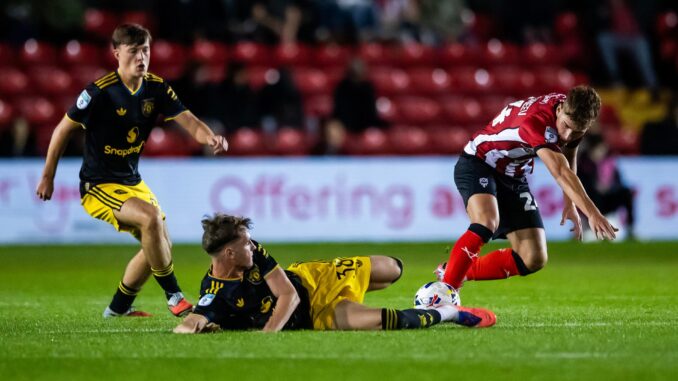
Manchester United’s academy is in the middle of a tough season from a breakout perspective due to fewer games, so the reinvention of wonderkids is underway to increase breakthrough chances.
Be it Amir Ibragimov turning himself into an all-action central midfielder instead of a silky winger, or Tyler Fletcher flying forward in search of goals and assists, youngsters are stepping up in new roles.
Amidst all the reinvention, one wonderkid who has been on Ruben Amorim’s radar, and even went to the pre-season tour, is familiarising himself with an entirely new position.
After being thrown in at the deep end at Man United, he has now played there again in England U19s’ latest win.
Jack Fletcher’s surprise new position
Jack Fletcher and his wand of a left foot had become a genuine source of excitement in the Man Utd academy and the English youth circuit in general.
As the more attacking twin, Fletcher was gaining rave reviews for his eye for goal and the ability to split defences with passes in the final third.
Fletcher had Bruno Fernandes’ seal of approval, and it looked like it was only a matter of time before a first-team call-up would arrive.
Then came the game against Athletic Club in the U21 Premier League International Cup, where the teamsheet caught everyone by surprise.
Fletcher started as a left-back at Old Trafford against quality opposition, a position where he couldn’t use his gifts on the ball.
He was run ragged by the direct attacking threat of Athletic, and it seemed like a learning moment.
However, his stints at LB have become more regular since then, with the latest one coming for England U19s in their 7-0 thrashing of Wales U19s.
Fletcher started at LB, and was replaced at half-time by fellow United youngster Harry Amass, for whom that position comes naturally.
Fletcher at left-back could help his development
It’s not unheard of for young players to play multiple positions because it helps them understand the game tactically.
It also helps them develop other facets of their game, but in Fletcher’s case, who will turn 19 in March next year, it’s a bit of an aberration.
Generally, the “other positions experiment” happens before the age of 16 or 17, because a player starts to recognise his strengths and weaknesses by the time he’s 18.
The reasoning behind Fletcher’s new position could well be to polish his defensive awareness and physicality, with modern football needing players to be all-rounders.
Nevertheless, this experiment does need to end soon so he can go back to his natural attacking position as a more well-rounded player.
Leave a Reply